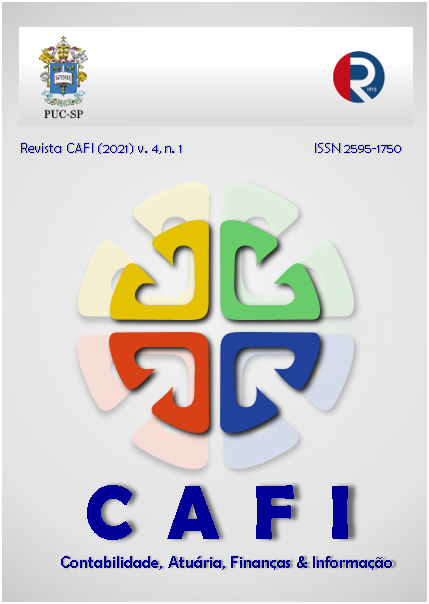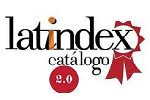Gestão de organizações contábeis brasileiras: uma investigação entre a adoção dos princípios da governança corporativa e a aprendizagem organizacional
DOI:
https://doi.org/10.23925/cafi.v4i1.51224Palabras clave:
Escritórios contábeis, governança corporativa, aprendizagem organizacionalResumen
Este estudo aborda a associação entre os princípios de governança corporativa e os fatores da aprendizagem organizacional nos escritórios contábeis brasileiros. Os dados primários foram obtidos por questionários eletrônicos com uma amostra final de 207 escritórios. Este estudo é exploratório, de natureza descritiva, realizado em ambiente de campo e classificado como quantitativo. O grau de governança corporativa obtido de 11,70 sinaliza que a adoção dos princípios de governança corporativa está num estágio intermediário e o grau de aprendizagem organizacional auferido de 8,20 demonstra que o ambiente é propício para a aprendizagem organizacional nos escritórios contábeis. À medida que o grau de governança corporativa evolui, naturalmente, ocorre uma potencialização dos fatores de aprendizagem organizacional, tais como diálogo, interação com o ambiente externo, experimentação e propensão para o risco. Dentre os principais achados desta pesquisa, destaca-se que há um relacionamento positivo entre a adoção dos princípios da governança corporativa e os fatores da aprendizagem organizacional (r=0,244). Quando os níveis de transparência das informações nos escritórios contábeis aumentam, também há um aumento no nível de tratamento justo e equânime entre os sócios e as partes interessadas (r=0,621). Conforme a utilização do diálogo aumenta, como forma de aprendizado, há um aumento na interação com o ambiente externo (r=0,776) e quando sugestões e novas ideias são bem atendidas e aceitas a utilização do diálogo como construção de conhecimentos comuns também aumenta (r=0,722).
Citas
Abadi, H. R., & Nematizadeh, F. (2012). Analyzing the Impact of Corporate Governance and Organizational Learning on Strategic Planning Effectiveness. International Journal of Learning & Development, 2(3).
Babic, V. (2003). Corporate Governance Problems In Transition Economies. Social Science Research Seminar.
Blair, M. M. (1998). For Whom Should Corporations Be Run?: An Economic Rationale for Stakeholder Management. Long Range Planning, 31(2), 195-200.
Castaneda, D. I., Manrique, L. F., & Cuellar, S. (2018). Is organizational learning being absorbed by knowledge management? A systematic review. Journal of Knowledge Management, 22(2), 299-325.
Chiva, R., Alegre, J., & Lapiedra, R. (2007). Measuring Organisational Learning Capability Among the Workforce. International Journal of Manpower, 28(3/4), 224-242.
Crossan, M., Lane, H., & White, R. (1999). An organizational learning framework: from intuition to institution. The Academy of Management Review, 24(3), 522-537.
Fedato, G. A., Rehn, A., & Almeida, E. (2009). O planejamento estratégico em empresas de serviços contábeis. Revista Contabilidade e Amazônia, 2(1), 44-55.
Fernandez, W. D., & Thams, Y. (2018). Board diversity and stakeholder management: the moderating impact of boards’ learning environment. The Learning Organization.
Fiol, M., & Lyles, M. A. (1985). Organizational Learning. The Academy of Management Review, 10(4), 803-813.
Goh, S. C., & Richards, G. (1997). Benchmarking the learning capability of organizacions. Europeam Management Journal, 15(5), 575-583.
Hitt, M. A., Ireland, R. D., & Hoskisson, R. E. (2001). Strategic Management: Competitiveness and Globalization. Cicinnati: Ohio: South-Western College Publishing.
Huber, G. P. (1991). Organizational Learning: The Contributing Processes and the Literatures. Organization Science, 2(1), 88-115.
IBGC. (2015). Código das Melhores Práticas de Governança Corporativa. (5ª Edição).
Kearney, W. D., & Kruger, H. A. (2013). A Framework for good Corporate Governance and Organisational. The Society of Digital Information and Wireless Communications, 36-47.
Larson, R., & Farber, B. (2010). Estatística Aplicada. (L. F. Vianna, Trad.) São Paulo: Pearson Prentice Hall.
Levitt, B., & March, J. G. (1988). Organizational Learning. Annual review of Sociology, 319-340.
Marôco, J. (2003). Análise estatística com utilização do SPSS (2 ed.). Lisboa: Edições Sílabo.
Martins, G. A. (2006). Sobre confiabilidade e validade. Revista Brasileira de Gestão de Negócios, 8(20), 1-12.
Rossetti, J. P., & Andrade, A. (2014). Governança Corporativa: Fundamentos, Desenvolvimento e Tendências. São Paulo: Atlas.
Shleifer, A., & Vishny, R. W. (1997). A Survey of Corporate Governance. The Journal of Finance, 52(2), 737-783.
Silveira, A. D. (2010). Governança Corporativa no Brasil e no Mundo: Teoria e Prática. Rio de Janeiro: Elsevier.
Souza, T. C. (2003). Modelo de gestão por atividades para empresas contábeis. Dissertação (mestrado). Programa de Pós-Graduação em Engenharia de Produção, Universidade Federal de Santa Catarina.
Williamson, O. E. (1996). The Mechanisms of Governance. Oxford: Oxford University Press.
Ziestma, C., Winn, M., Branzei, O., & Verinsky, I. (2002). The war of the woods: Facilitators and impediments of organisational learning processes. British Journal of Management, 13(2), 61-74.
Descargas
Publicado
Cómo citar
Número
Sección
Licencia
Declaração de Direito Autoral
Autores mantém os direitos autorais e concedem à revista o direito de primeira publicação, com o trabalho simultaneamente licenciado sob a Licença Creative Commons Attribution que permite o compartilhamento do trabalho com reconhecimento da autoria e publicação inicial nesta revista.
Declaração de Privacidade
Os nomes e endereços informados nesta revista serão usados exclusivamente para os serviços prestados por esta publicação, não sendo disponibilizados para outras finalidades ou a terceiros.









